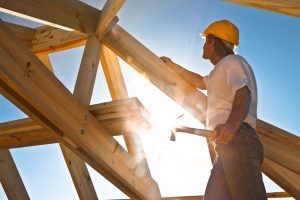
Analysis from the National Association of Homebuilders on the Census Bureau’s construction spending data shows that residential construction spending rose 1.4% to an adjusted rate of $540.7 billion in December 2019.
The report states that falling mortgage rates have helped lead to the sixth consecutive monthly increase after declines in the first half of 2019. The total value of private residential construction was $514.3 billion in 2019, which is 4.7% lower than in 2018.
The monthly increase from November to December is due to the growth of single-family construction and remodeling. Single-family spending was at an annual pace of $289.3 billion—up 2.7% in December and 5.2% from December 2018.
Non-residential construction, however, fell 1.8% in December to $450.5 billion and fell marginally 0.1% annually.
The rise in residential construction has caused the price of lumber to grow as more new are being built that any time since the Great Recession, according to The Wall Street Journal.
The Journal states that lumber futures are up more than one-third from last June’s lows. Futures for March delivery closed at $422.30 per 1,000-board feet on the Chicago Mercantile Exchange.
Shares of the largest timber company, Weyerhaesuer Co., are up about 5.5% over the last year but still a quarter below the highs from June 2018.
Weyerhaesuer on Friday said it lost $76 million in 2019, compared with a $748 million profit the year before.
The company attributed its issues last year from the trade dispute with China, which caused the company to reduce log exports from the U.S. Southeast, as well as a flood of cheap competition from European spruce logs salvaged after beetle attacks.
The slowing of price growth for building materials could be seen as positive news, as a report by the NAHB last year that increasing regulatory costs, the shortage of construction workers, tariffs on $10 billion worth of building materials, and concerns over housing finance have impacted housing affordability.
The report says that regulations account for 25% of the price of a single-family home, and 30% of the cost of multi-family development.
“Removing regulatory barriers that contribute to the increased costs of housing will pave the way to homeownership,” said NAHB Chairman Greg Ugalde, a builder, and developer from Torrington, Connecticut. “Homebuilders and the residential construction community are committed to working with Congress to ensure homeownership is within reach of hard-working families.
Doug Duncan, SVP and Chief Economist at Fannie Mae, told MReport that the recent Phase One deal with China signed by President Donald Trump will have a “fairly minor impact” on GDP.
He said the most significant aspect of the deal is not the reduction of existing tariffs, but the elimination of planned additional tariffs. An additional 15% tariff on $160 billion worth of exports from China scheduled for December 15 will no longer take place. Also, the 15% tariff on $112 billion of Chinese exports put in place September 1 is being cut to 7.5%.
“It is better for consumers in the U.S. and China that the tariffs were reduced,” Duncan said. “The other part of it [the trade agreement] committed China to a huge increase in the purchase of US goods. In fact it is difficult to believe that the infrastructure exists to be able to execute it all in a timeframe that's contemplated.”

 theMReport.com Your trusted source for mortgage banking news
theMReport.com Your trusted source for mortgage banking news








